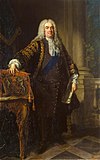Thomas Trevor, 1st Baron Trevor
The Lord Trevor | |
|---|---|
 Chief Justice Trevor | |
| Lord President of the Council | |
| In office 8 May – 19 June 1730 | |
| Monarch | George II |
| Prime Minister | Sir Robert Walpole |
| Preceded by | The Duke of Devonshire |
| Succeeded by | The Earl of Wilmington |

Thomas Trevor, 1st Baron Trevor, PC (8 March 1658 – 19 June 1730) was a British judge and politician who was Attorney-General and later Lord Privy Seal.
Biography
[edit]Trevor was the second son of Sir John Trevor III.[1] and was educated privately before entering the Inner Temple (1672) and Christ Church, Oxford. He was called to the bar in 1680.[2]
He was made King's Counsel in 1683 and was knighted and made Solicitor General in 1692, being promoted to Attorney-General in 1695. In 1701 Trevor was appointed Chief Justice of the Common Pleas. He was also a Privy Councillor (1702–1714) and First Commissioner of the Great Seal (1710). In 1712 he was created a peer as Baron Trevor of Bromham.[3] He was created as one of Harley's Dozen when twelve new peerages were distributed to shift the political balance in the Whig-dominated House of Lords towards the Tories in order to secure the Peace of Utrecht.
On the accession of George I in 1714 he was deprived of his offices for alleged Jacobite sympathies, but from 1726 he was restored to favour as Lord Privy Seal (1726 to his death),[3] one of the Lords Justice Regents of the Realm (1727), Lord President of the Council (1730) and Governor of the Charterhouse.[2]
In 1707 he was elected a fellow of the Royal Society.[2]
Family
[edit]In 1690 he married Elizabeth (1672-1702), daughter of John Searle of Finchley, by whom he had 5 children:
- Thomas Trevor (1691-1753), 2nd Baron Trevor, who married Elizabeth (1697-1734), daughter of Timothy Burrell of Ockenden House, Cuckfield, a barrister, by her having one daughter, Elizabeth (1715-1761), who married Charles Spencer, 3rd Duke of Marlborough, thereby becoming the ancestress of the future Dukes of Marlborough and Winston Churchill
- Ann Trevor (1692-1785), who died unmarried
- Elizabeth Trevor (1693-1773), who died unmarried
- John Trevor (1695-1764), 3rd Baron Trevor, who married Elizabeth (c.1709-1782), daughter of Richard Steele, a writer, playwright, and politician, by her having one daughter Diana-Maria (1744-1778), who had severe learning difficulties and died unmarried
- Laetitia Trevor (1697-1769), who married Peter Cock of Camberwell, Surrey and had issue
In 1704 he married Anne Barnard, (c. 1670–1723), the daughter of Robert Weldon (or Wilding), a merchant in Fleet Street, London and Colonel of the Tower Hamlets Regiment. Anne had previously been married to Sir Robert Barnard of Brampton, 3rd Baronet, with whom she had had six children.[4] By Anne, Trevor had two further children who lived to adulthood:
- Robert Trevor (1705-1783), 4th Baron Trevor (later created 1st Viscount Hampden)
- Richard Trevor (1707–1771), who was bishop of St Davids from 1744 to 1752, and then bishop of Durham.[3]
Notes
[edit]- ^ Chisholm 1911, p. 256.
- ^ a b c "Fellow details". Royal Society. Retrieved 28 January 2017.
- ^ a b c Chisholm 1911, p. 257.
- ^ Palmer, Kathleen (2018). Ladies of Quality & Distinction. London: The Foundling Museum. p. 12.
References
[edit]- This article incorporates text from a publication now in the public domain: Chisholm, Hugh, ed. (1911). "Trevor, Sir John". Encyclopædia Britannica. Vol. 27 (11th ed.). Cambridge University Press. pp. 256–257.
Further reading
[edit]- Rigg, James McMullen (1899). . In Lee, Sidney (ed.). Dictionary of National Biography. Vol. 57. London: Smith, Elder & Co. pp. 228–230.
- Lord chancellors
- 1658 births
- 1730 deaths
- English MPs 1690–1695
- English MPs 1695–1698
- English MPs 1701
- Chief justices of the Common Pleas
- Lord Presidents of the Council
- Lords Privy Seal
- Members of the Privy Council of Great Britain
- Barons Trevor
- Peers of Great Britain created by Queen Anne
- Attorneys general for England and Wales
- Fellows of the Royal Society
- Members of the Parliament of England for Plympton Erle
- Peerage of Great Britain baron stubs

